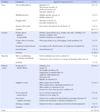Abstract
Purpose
The study was conducted to explore experience of using humor among psychiatric-mental health nurses.
Methods
Semi-structured in-depth interviews were used to collect data from 30 nurses working in community mental health centers or psychiatric wards. Data were categorized and coded using content analysis.
Results
The findings confirm that 11 categories, 43 sub-categories, and 104 statements were drawn from 4 domains. The four domains included effectiveness of humor, effective use of humor, ineffective use of humor, and barriers and promotive strategies to the use of humor. Nurses experienced positive and negative effects of humor. Popular fad words, jokes, imitation, and compliments were identified as effective types of humor. Discounting humor and belittling humor were identified as ineffective types of humor. Effective humor was humor that was used after establishing a trust relationship and when the patient's mental status was stable. Barriers to using humor were heavy workload, nurses' careful character, and nurses' concern about patients' responses.
Figures and Tables
References
1. Hornby A, Sydney A, Wehmeier S. Oxford Advanced Learner's Dictionary. Oxford: Oxford University Press;1995.
3. McGhee PE. Humor, its origin and development. San Francisco: W. H. Freeman and Company;1979.
4. Pasquali EA. Learning to laugh: humor as therapy. J Psychosoc Nurs Ment Health Serv. 1990; 28(3):31–35.

5. Freud S. Jokes and their relation to the unconscious. New York: W. W. Norton & Company;1990. p. 230.
7. Beck CT. Humor in nursing practice: A phenomenological study. Int J Nurs Stud. 1997; 34(5):346–352.

8. Davidhizar R, Schearer R. Humor: No geriatric nurse should be without it. Geriatr Nurs. 1992; 13(5):276–278.

9. Stuart GW. Principles and practice of psychiatric nursing. 9th ed. St. Louis: Mosby;2009. p. 30.
10. Robinson VM. Humor in the health professions. Thorofare: Slack. 1977. Cited by Bellert JL. Humor: A therapeutic approach in oncology nursing. Cancer Nurs. 1989; 12(2):65–70.
11. Kaplan HB, Boyd IH. The social functions of humor on an open psychiatric ward. Psychiatr Q. 1965; 39:502–515.

12. Gelkopf M, Sigal M, Kramer R. Therapeutic use of humor to improve social support in an institutionalized schizophrenic inpatient community. J Soc Psychol. 1994; 134(2):175–182.

13. Suh MJ, Kim KS. A study on the sense of humor of the hospitalized patients. Korean J Adult Nurs. 1993; 5(1):72–85.
14. Struthers J. An investigation into community psychiatric nurses' use of humour during client interactions. J Adv Nurs. 1999; 29(5):1197–1204.

16. Sayre J. The use of aberrant medical humor by psychiatric unit staff. Issues Ment Health Nurs. 1993; 22:669–689.

17. Jun JY, Kim MS. A study on the nurses appreciation and use of humor. J Korean Acad Adult Nurs. 2004; 16(3):366–377.
18. Oh YJ. Effect of humor therapy on anxiety, depression, and humor coping of the schizophrenic patients [master's thesis]. [Seoul]: Kyunghee University;1999.
19. Yu SJ, Yang S, Lee JE. Effect of humorous video tapes on mental health status and interpersonal relationships with psychiatric inpatients. J Korean Acad Psychiatr Ment Health Nurs. 1999; 8(2):319–330.
20. Downe-Wamdoldt B. Content analysis: Method, applications, and issues. Health Care Women Int. 1992; 13:313–321.

21. Lee EO, Lim NY, Park HA, Lee IS, Kim JI, Bae JY, Lee SM. Nursing research and statistical analysis. 2009. p. 789.
22. Isola A, Åstedt-Kurki P. Humour as experienced by patients and nurses in aged nursing in Finland. Int J Nurs Pract. 1997; 3:29–33.

24. Haydon G, van der Riet P. A narrative inquiry: How do nurses respond to patients use of humour? Contemp Nurse. 2014; 46(2):197–205.

25. Ghaffari F, Dehghan-Nayeri N, Shali M. Nurses' experiences of humour in clinical settings. Med J Islam Repub Iran. 2015; 29(182):1–11.
26. Samson AC, Gross JJ. Humour as emotion regulation: the differential consequences of negative versus positive humour. Cogn Emot. 2012; 26(2):375–384. DOI: 10.1080/02699931.2011.585069.

27. Richman J. The lifesaving function of humor with the depressed and suicidal elderly. Gerontologist. 1995; 35(2):271–273.

28. Simon J. Humor techniques for oncology nurses. Oncol Nurs Forum. 1989; 16:667–670.




 PDF
PDF ePub
ePub Citation
Citation Print
Print






 XML Download
XML Download